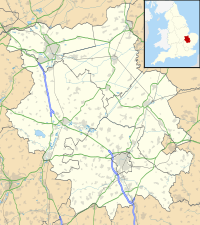Cheveley Castle facts for kids
Quick facts for kids Cheveley Castle |
|
|---|---|
| Cheveley, Cambridgeshire, England | |
| Coordinates | 52°13′28″N 0°27′23″E / 52.22441°N 0.45630°E |
| Type | Fortified manor house in an Edwardian style |
| Site information | |
| Condition | Only limited masonry survives |
| Site history | |
| Materials | Stone |
Cheveley Castle was a special kind of fortified house from the Middle Ages. It was located near the village of Cheveley in Cambridgeshire, England. This castle wasn't just a regular home; it was built to look strong and impressive, almost like a small fortress.
Contents
Discovering Cheveley Castle
What Was Cheveley Castle?
Cheveley Castle was a fortified manor house. A manor house was a large country house, often the main home of a lord or wealthy person. "Fortified" means it had features to protect it, like strong walls or a moat. This castle was built in a style popular during the time of King Edward I, even though it was constructed a bit later.
Who Built This Castle?
A very rich and important man named Sir John Pulteney built Cheveley Castle. He was a successful merchant, which means he made his money by trading goods. He was also the Lord Mayor of London, a very powerful position in the city. Sir John started building the castle around the year 1341.
How Was It Designed?
Cheveley Castle was designed with a few key features. It had four round towers, which would have looked very grand. There was also a gatehouse, which was the main entrance, and a bailey wall. A bailey wall is an outer defensive wall that encloses a courtyard. The castle was surrounded by an elaborate moated site. A moat is a deep, wide ditch, usually filled with water, that goes around a castle or building for protection.
This castle was quite unique for Cambridgeshire. It was probably not built just for defence. Instead, it might have been used more as a fancy hunting lodge. In the 1300s, Cheveley was in the middle of a large medieval deer park. This means it was a place where deer were kept for hunting. The impressive moat at Cheveley might have even inspired other similar moated designs in the eastern part of England.
What's Left Today?
Over time, Cheveley Castle started to fall apart, especially after the early 1600s. Today, only a few pieces of the original stone walls remain. The site where the castle once stood is now a "scheduled monument." This means it's a nationally important historical site that is protected by law.
 | William L. Dawson |
 | W. E. B. Du Bois |
 | Harry Belafonte |


